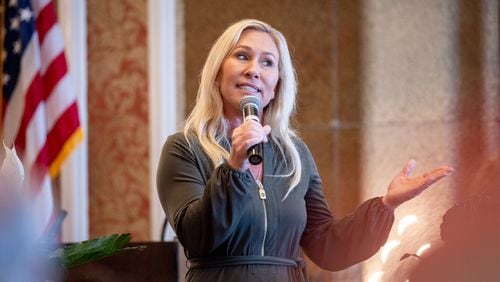We published a disturbing story last week about how undercover Russians targeted Atlanta with disinformation in 2015 in advance of the presidential election.
In "Undercover Russians took aim at Atlanta through Twitter posts," our Jennifer Peebles showed how a simple and scary international tactic used to undermine American democracy was operating close to home.
A little background:
Experts have been examining Russian interference in the 2016 election since before voters cast their ballots that November.
Special counsel Robert Mueller has been leading a probe into the meddling, and a federal grand jury in Washington, D.C. has indicted 13 Russians on charges that they attempted to interfere with the 2016 presidential election. (Those Russians will almost certainly never face trial.)
While Mueller’s work has created a partisan divide over whether Russian involvement was intended to or actually did help President Trump get elected, there is no doubt about the actual effort to disrupt the election.
At the center of these efforts is a Russian “troll factory” based in St. Petersburg, Russia, called the Internet Research Agency. Reports have linked its work to Russian President Vladimir Putin and the Kremlin.
This propaganda effort focuses on social media, creating fake people and making fake posts often about fake things. The New York Times has reported that the Internet Research Agency employs shifts of workers who spend their days managing several accounts posing as Americans.
You might remember an early effort by the organization. In 2014, when the Ebola crisis was getting a lot of attention, there was a disturbing story posted by Twitter users about an outbreak of Ebola in Atlanta. Pictures, videos and the hashtag #EbolainAtlanta. None of it was true.
On the same day, another set of Twitter accounts tried to exploit the emotions around racial tension created by Michael Brown’s death in Ferguson, Missouri. These users invented a story about an African-American woman being shot by police. Again, not true.
The New York Times reported that both were likely early work of the Internet Research Agency.
Peebles’ story had its roots in her own curiosity about the issue — and her remarkable journalistic skills.
She works as a data journalist in our newsroom, building and analyzing data sets from public records and other sources to give depth to our reporting. She often works with other reporters on stories that simply could not be told without her data skills. Her recent work includes a special report about tracking concussions in college football and a lot of deep investigative work on the Atlanta bribery case.
For last week’s story about Russian activity in Atlanta, Peebles had seen another report about the Russian trolling operation, and she discovered that NBC had obtained from Congress some of the Twitter handles for troll accounts identified by Twitter itself and turned over to Congressional investigators.
Twitter deleted about 200,000 tweets from those accounts, so you can’t just call up those tweets the normal way anymore — but NBC talked to three sources who had knowledge of Twitter’s data systems, and those sources were able to harvest about 200,000 tweets and save them for NBC to analyze.
“NBC had open-sourced its data — it had published the entire data set with an invitation for journalists, researchers, anyone, to look at it and analyze,” Peebles said. “NBC asked that anyone who wrote about the data credit them and shoot them an email. We did both.”
Peebles then downloaded the tweets, and built a data set for analysis. She started by looking for mentions of Georgia and Atlanta, major cities, and then added to the search criteria names of some prominent politicians, including members of Congress, the mayor, the governor. She added in the Falcons and Braves. A colleague suggested searching for Killer Mike, and he was indeed mentioned. She put in names of celebrities and Jimmy Carter.
“Just kind of trying to cast a wide net to see what would come up,” she said.
Over a couple of days, she estimates she read 2,000 or more tweets.
“I only came across one tweet that mentioned Atlanta traffic,” Peebles said. “Maybe that’s how we all should have figured out these folks were not real Atlantans.”
One of her more disturbing discoveries:
She looked at what’s left of the Twitter page for the @atlantaonline account. The account’s been suspended, so you can’t see any of the tweets.
But if you search for the Twitter handle, you can see where average Atlantans saw @atlantaonline tweets and replied to the account.
“They thought there was a real Atlanta person at the computer giving out Atlanta news and they were talking to that person and commenting about the news,” Peebles said. “That account had 17,000 followers. I don’t know how many of those 17,000 people were real and how many were fellow trolls, but it made me wonder how many Atlanta people thought @atlantaonline was some kind of legit news outlet.”
Of course, this is a good time to remind you that they can always follow @ajc and @ajceditor on Twitter to make sure the news you get is from a trusted source.
Peebles work found that criticized CNN, U.S. Rep. John Lewis and made efforts to come across as real Atlantans. But her work exposed them.
Like all the journalists at the AJC, Peebles is committed to giving you the real story.
“The Internet has changed our lives in ways we don’t realize,” she said. “I enjoy using social media, but it has good and bad qualities. Seeing that so many people, average Atlanta folks, thought they were listening to news or commentary by a real Atlanta person, suggests there could be a quick and easy way for someone with bad intentions to spread misinformation to a large group of people if they so desired. It all seems like something out of a spy novel, only we’re really living through it.”






